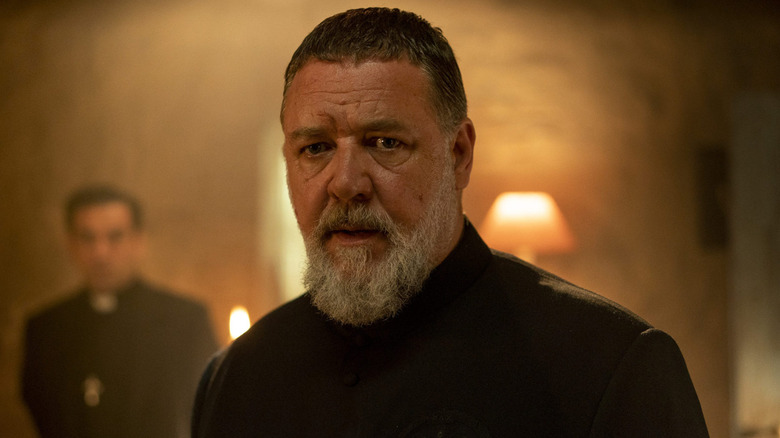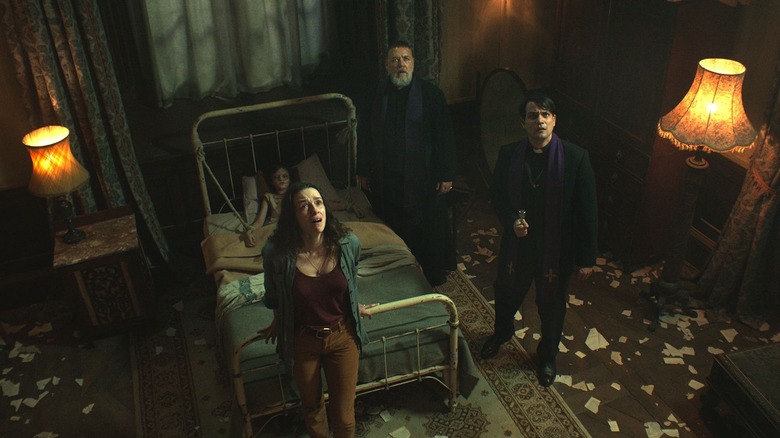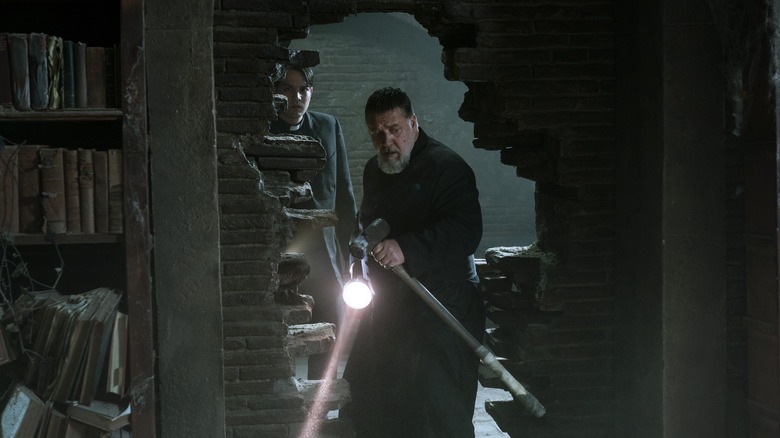The Pope's Exorcist Review: The Power Of Crowe Compels
- A delightfully entertaining, deeply committed lead performance from Russell Crowe
- Operates more as a detective-style thriller than an exorcism movie — which helps overcome some of the familiarity with the narrative
- Possessed children cursing at adults will always be funny
- It isn't remotely scary — it's a very light R-rated movie
- The film attempts to grapple with weightier issues of faith, and the darker side of the Catholic Church's history in Europe. These are the moments where it stumbles the most
Some movies, in hopes that they will kick-start a franchise, end on a note that teases a potential sequel. It's a confident move on behalf of both the filmmakers and the studios but is nowhere near as self-assured as "The Pope's Exorcist," which teases 199 potential sequels at the close of its story — and this figure is still just a fraction of the 160,000 exorcisms the real-life Father Gabriele Amorth claimed to have conducted in his lifetime.
Adapted from two separate volumes of Amorth's own memoirs (as the movie jovially highlights, he was nothing if not a shameless self-publicist), director Julius Avery's film makes up in eccentric entertainment what it lacks in genuine scares, distinguishing itself from the rest of this horror sub-genre by approaching the material as a detective story first and foremost. It's a wise decision, considering how "The Exorcist" remains unparalleled when it comes to tales of faith and possession. Avery doesn't even attempt to invoke its memory despite the various, glaringly obvious surface-level similarities between the two (not to mention the fact that William Friedkin, director of "The Exorcist," made his own documentary about Amorth back in 2017).
The Hercule Poirot of exorcisms
Instead, Julius Avery's film characterizes its protagonist — played with hammy glee by Russell Crowe — as the Hercule Poirot of exorcisms, a man who has found unparalleled success in his field by utilizing various unusual methods to lure demons out from within. Unusually for this genre, he's a man of his cloth who remains unconflicted by his faith, although this may be a sign that the film doesn't possess the depth required to truly interrogate these religious themes; even as the story connects to a broader history of crimes committed by the Catholic Church in Europe, you get the sense that Avery is eager to return to the more straightforward thrills. And he would be right to do so: nobody is coming to a film called "The Pope's Exorcist" looking for sincere introspection on what it means to follow the word of God.
The story takes place in the late 1980s, shortly after Father Gabriele Amorth was appointed an exorcist by the Diocese of Rome. However, in this iteration of his life, he's a renegade who has ruffled too many feathers by performing rituals without the blessing of his holiness to do so — something he doesn't see as an issue because he believes that very few of the people he's hired to visit are caught under the Devil's spell. But it isn't long until he comes face-to-face with a very real case. He's called to a mansion under renovation in the Spanish countryside where young Henry (Peter DeSouza-Feighoney) is showing signs of transformation, shouting various over-the-top obscenities at his stressed mom Julia (Alex Essoe). And, in the clearest sign of possession, this 10-year-old boy is now voiced by English character actor Ralph Ineson, whose thick Yorkshire accent is the movie's secret weapon.
It's a trope of the exorcism movie to feature a young child screaming all manner of dirty words at their horrified families, and Avery understands that most audience members will still have the memory of Regan MacNeil (Linda Blair) telling Father Damien Karras (Jason Miller) that his "mother sucks c***s in Hell," a gloriously foul-mouthed insult no possessed child has ever been able to match in the 50 years of exorcism movies since. But in a movie that strives for camp entertainment as much as this one does, it is a trope that can't go unacknowledged — and in realizing that nothing on the page could live up to the immortal screenplay of "The Exorcist," Ineson's voice is instead here to breathe life into the various playground insults littered throughout the screenplay. A priest getting called a "panty sniffer" may have not seemed particularly noteworthy written down, for example, but the delivery makes it unforgettable.
This wouldn't work without Crowe
"The Pope's Exorcist" is a movie that relies on a lot of heavy lifting from its cast, who are all keenly aware of how familiar this material is and the various ways in which it is underdeveloped. This is mostly shouldered by Russell Crowe, the rare Academy Award winner who now feels more at home in this brand of junky cinema; his Father Amorth is the most he's felt like a proper movie star in years, a character who commands such immediate attention that it's easy to overlook Crowe's accent wandering around the entire European continent. Even as his take on this character feels perilously close to Kenneth Branagh's interpretation of Hercule Poirot, it's hard to imagine anybody but Crowe proving as engaging in the role, or embodying the character's various quirks in a way that doesn't come across as insufferable. Then again, it's hard to imagine another actor of Crowe's caliber treating this material with sincerity, refusing to leave it as a paycheck gig and nothing more.
It works as a movie star vehicle for Crowe in a way that Julius Avery's previous film, the immediately forgotten Amazon superhero movie "Samaritan," intended to be for Sylvester Stallone. That film's flaws only become more apparent when seeing the ways in which he works with his cast to enliven a similarly uninspiring screenplay here — Crowe offers the charm and charisma that can make a familiar narrative engaging, whereas Stallone reverted to autopilot, even as the script to that film felt deliberately written as a meta-narrative reflecting his career. All it proves is that a movie star's vehicle is only as good as the movie star chosen to lead it, and Avery has certainly atoned for the sins of his last film here.
If you're coming to "The Pope's Exorcist" praying for a terrifying new addition to the exorcism film canon, then you'll be sorely disappointed. I suspect that, if it weren't for some expletive-heavy dialogue and a couple of brief sequences of blood splatter, this would be a PG-13-rated affair, perfectly suited to a teen audience weaned on silly Blumhouse thrillers. However, that's not to be — and while there aren't any notable scares to mention here, and the exploration of generational Catholic guilt is such an afterthought it barely warrants a mention, it remains frequently entertaining thanks to the power of Crowe's Lambretta-riding protagonist. With him in the lead, it's easy to want every last one of the 199 sequels the ending threatens.
"The Pope's Exorcist" premieres in theatres on April 14.


